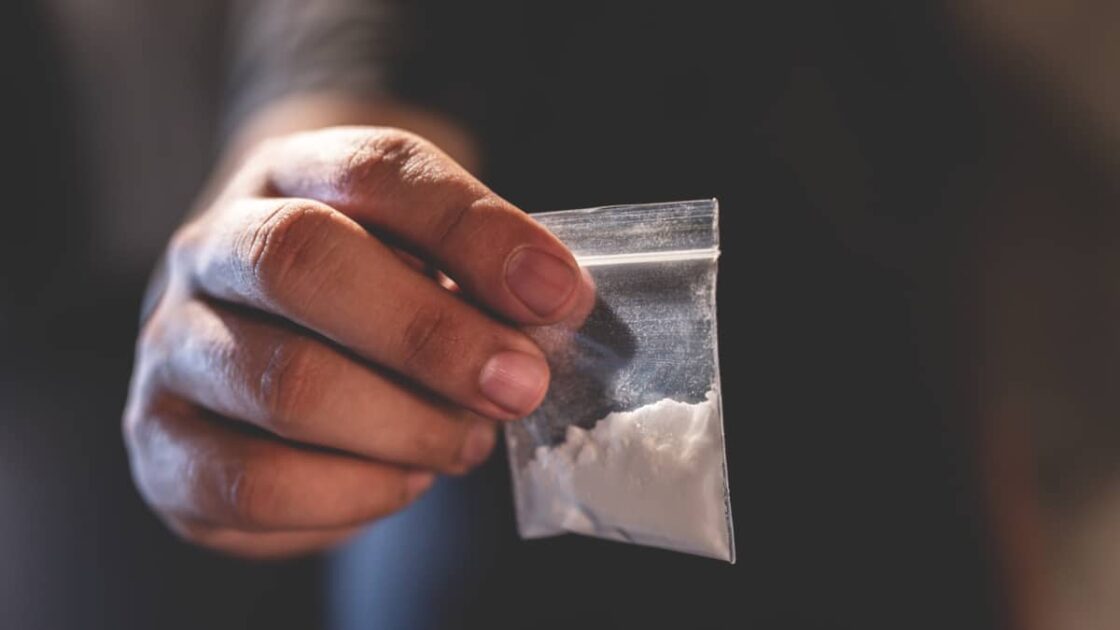What happens when I take cocaine or crack?
Cocaine is a white powder without a smell. It is a highly addictive stimulant drug that can make users feel more energetic and talkative.

Cocaine (also known as coke) is a white crystal-like powder without a smell. Cocaine is normally sniffed up the nose and absorbed into the bloodstream through the nasal membranes, though users will sometimes dab the powder onto their fingers and rub it on their gums or tongue. It may also be injected.
Cocaine is derived from a natural plant source, coca leaves. However, street cocaine is usually “cut” (mixed) with other substances.
Cocaine can also be processed into a smokeable form called crack cocaine, which are small yellow or white rocks of freebase cocaine. This is usually smoked in a glass pipe or in a cannabis joint.
What are the effects of cocaine?
Cocaine is a stimulant drug, which means that it stimulates the body’s central nervous system. This can cause symptoms such as larger (dilated) pupils, high blood pressure and increased heart rate and body temperature.
Cocaine makes users feel good by stopping the brain from absorbing and recycling various chemical messengers (neurotransmitters) in the brain such as noradrenalin, serotonin and dopamine, causing them to build up in the brain. These three chemicals are associated with feelings of reward, pleasure and happiness.
The effects of crack smoking are immediate, peaking (coming up) for about two minutes and lasting for about 10 minutes. When snorting coke, it takes longer to peak.
The effects of snorted cocaine last longer than smoked cocaine but still are not very long lasting, only around 20-30 minutes. As a result, users may feel the need to keep taking cocaine, or take several doses, to reach the desired high and maintain it.
The short term effects of cocaine
- You may feel more awake, energetic, talkative, happier and confident for about 30 minutes.
- Cocaine can also cause a higher sex drive.
- Your heart rate may speed up, and your pupils can dilate (get bigger).
- Cocaine use can also lead to dry mouth, increased sweating, loss of appetite and increased body temperature.
- Snorting cocaine can also cause a runny or stuffy nose.
- When gumming or snorting cocaine, parts of your mouth, nose or face may temporarily feel numb.
- You may have an immediate craving for more cocaine after the effects wear off.
In large amounts, coke can make you feel anxious, panicked or paranoid, or can cause aggression. Taking large, overdose quantities of cocaine can also lead to seizures, heart attacks, stroke and organ failure due to how the drug raises blood pressure, narrows the arteries and puts stress on the heart by raising your heart rate.
It is important to be aware of the symptoms of overdose and make sure you know what to do if you or someone you know experiences a drug emergency.
Cocaine addiction
Cocaine is a highly addictive substance, both physically and psychologically, with injection and smoking of crack thought to be the most addicting ways of taking the drug. Though some users may only occasionally or experimentally use coke, others will go on to develop an addiction.
If you think you might be dependent on drugs, there are a number of services that can help. Find a service near you here or contact the Drugs Helpline on 1800 459 459 to find out about options in your area.
Long term effects of cocaine
Sustained, heavy use of cocaine may cause aggression and violence, psychosis, paranoia, restlessness and confusion. It may cause anxiety disorders, memory problems, hallucinations and depression. It can cause loss of sex drive, weight loss and kidney damage.
Other symptoms associated with long-term cocaine use include:
- high blood pressure
- raised pulse rate and heart palpitations
- heartbeat rhythm abnormalities (because the heart is put under pressure to beat faster)
- heart attacks
- strokes
Snorting can cause rupture of the membrane in the nose, causing bloody noses and damaging nose tissue. Longer term, snorting cocaine can also cause damage to the cartilage and even the bone of the nose and lead to holes in the septum (middle part) of the nose and, more rarely, the roof of the mouth.
If you inject cocaine, you can risk damaging your veins and developing gangrene. When you use needles that have been used before by someone else, injecting cocaine puts the user at risk of contracting HIV, bacterial infections, Hepatitis B and other diseases. If you do decide to inject cocaine, it’s really important that you inject as safely as possible. Read Merchant Quay’s guide to safer injecting.
Cocaine may also harm the health and development of babies born to those who use cocaine during pregnancy.
How to help a comedown from cocaine
When the effects of coke start to wear off, people can experience a long ‘comedown’, when they feel depressed and run down. This crash can happen for days afterwards. During a comedown you can feel tired, panicky and in extreme emotional or physical distress. A comedown can also cause diarrhoea, vomiting, shaking, insomnia and sweating. If you have drunk alcohol and taken cocaine, your comedown may be worse as it causes you to be extremely dehydrated.
To help with a comedown :
- Drink plenty of water, do not drink more alcohol or take more drugs
- Although you may not feel hungry try to eat, balanced meals will help to restore your energy levels
- Try to make time for some self-care activities, whatever that may mean for you
- Reach out to friends or loved ones and be honest about how you are feeling if you are feeling low. You do not need to disclose that you took drugs if you are not comfortable, but it is a good idea to share how you are feeling if your mood dips in the days after drug use.
- Find out more about dealing with a drug comedown.
Feeling depressed or anxious after taking coke
If you have taken cocaine and are feeling anxious or depressed remember that these are normal side effects which should pass in time.
Talk to someone if you are feeling anxious or depressed, if you do not feel that you can be honest to friends or family members about taking drugs remember that there are other supports out there that can help.
- Drug and Alcohol Helpline – Freephone 1800 459 459
What does the law say about Cocaine?
Under the Misuse of Drugs Act, it is illegal to produce, possess or supply the drug. It is also illegal to allow premises to be used for producing or supplying cocaine. Learn more about drugs and the law and your rights.
Reducing harm when taking drugs
If you choose to take drugs, remember:
- Start with a very small test dose and wait at least two hours before taking more.
- Stay with your friends and do not leave anybody who is intoxicated on their own.
- Avoid mixing drugs and alcohol. Every time you mix drugs, including alcohol and prescription medication, you increase the risks.
- Always hydrate with water, but don’t force yourself to chug liquids. Do not drink more than a pint of water per hour.
- If you are dancing, remember to take breaks from dancing and give yourself time to cool down.
- Don’t be afraid to get help if you or a friend become unwell or feel suicidal after using drugs. Call 112 or 999.
Supports and Services
- Drugs.ie: Online information and support for drug and alcohol use. Includes a national directory of drug and alcohol services
- HSE Drugs, Alcohol, HIV and Sexual Health Helpline: Freephone 1800 459 459
- You can contact Youth Information Chat, an online service that can put you in touch with Youth Information Officers based all around the country, for more general information
- You can also contact the HSE’s Drug and Alcohol Helpline on freephone at 1800 459 459 if you want to discuss your cocaine use
Feeling overwhelmed and want to talk to someone?
- Get anonymous support 24/7 with our text message support service
- Connect with a trained volunteer who will listen to you, and help you to move forward feeling better
- Whatsapp us now or free-text SPUNOUT to 50808 to begin.
- Find out more about our text message support service
If you are a customer of the 48 or An Post network or cannot get through using the ‘50808’ short code please text HELLO to 086 1800 280 (standard message rates may apply). Some smaller networks do not support short codes like ‘50808’.






